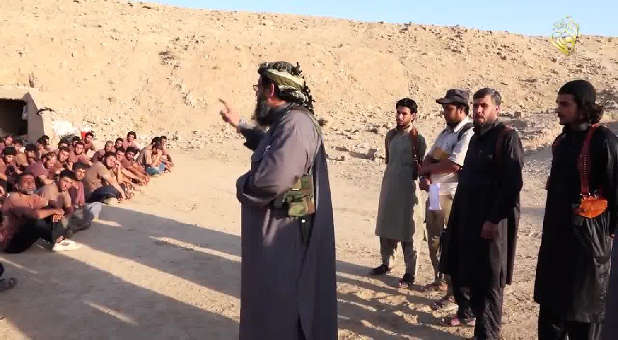Why Iran Is Really Fighting Against Islamic State
Shariah Law, Human Rights Violations and Religious Intolerance
As different as Iran—a sovereign state comprising the structures of a national society—may be from the IS incursion, they share an adherence to sharia law, the moral code and religious law of Islam, though they differ on their interpretation and practice.
Deriving from a variety of sources, including the Islamic holy book, the Quran; and the Hadith, the sayings and actions of the Prophet Mohammed, sharia legal processes are dramatically different from Western legal processes.
For example, in Iran as in many other Islamic countries, Muslim citizens who choose to convert from Islam are considered apostate, and subject to the death penalty.
Iran’s Continual Failed Promises of Religious Freedom
President Rouhani, who took office in August 2013, promised religious freedom as a Presidential candidate. In April 2013 he said “All Iranian people should feel there is justice. Justice means equal opportunity. All ethnicities, all religions, even religious minorities, must feel justice.”
However, Rouhani’s promises have not translated into any major improvements regarding human rights and freedom of expression, according to U.N. Secretary-General Ban Ki-moon’s annual report to the General Assembly on human rights in Iran.
Just this week, on Oct. 14, Rouhani’s adviser on ethnic and religious minorities’ affairs said “Everyone is free to practice his/her own faith, but no one has the right to promote his/her faith.”
“We do not allow any individual or group to invite people to sects or religions other than Islam,” said the adviser, Ali Younesi, in an interview with the Revolutionary Guard-backed Fars News Agency. “We consider this dangerous for people and therefore illegal. They can be busy with their own business. However, it is not acceptable, for instance, if a Christian invites a Muslim to Christianity.”
Mohabat News, an Iranian news agency, reported that the former minister of intelligence from the administration of Rouhani’s predecessor stressed that evangelical activities are illegal in Iran and must be stopped.
Earlier this year, Human Rights Watch also released a scathing report outlining how discrimination against women and religious minorities has continued under President Rouhani’s government.
In March, the US Commission on International Religious Freedom, an advisory body to Congress, condemned a global rise in the use of “Blasphemy Laws.” In its report, Prisoners of Belief: Individuals Jailed under Blasphemy Laws, the commission charges the Iranian government with frequently targeting “religious minorities, particularly Bahá’ís, Christians, and Sunni and Sufi Muslims, as well as Shi’a Muslim dissidents and journalists.”
In Iran, detaining Christians is common practice. According to Open Doors, persecution of certain religious minorities has intensified since 2005, and as of September, 75 Christians were in jail for faith-related reasons. Some report being harmed while in jail and said Christmas is a period of increased arrests because of a higher number of house churches being raided.
According to Amnesty International, Iran continues to persistently persecute “ethnic, religious and linguistic minority communities” and commits serious human rights violations including the execution of “more people than any country in the world, other than China.”
Charges Against Christians Increasingly Severe
In September, three Iranian Christians from the Church of Iran were sentenced to death after being charged with “spreading corruption on earth,” and for “enmity against God.”
On Sept. 30, both charges were dropped, but now all three—Pastor Matthias Haghnejad, Pastor Behnam Irani and Deacon Silas Rabbani—have been tried for “action against national security” and “creating a network to overthrow the system,” and are awaiting the verdicts.
According to Christian Solidarity Worldwide, a human-rights watchdog and advocacy network, the dropping of the death penalty against the three Christians occurred one week after a 37 year-old Muslim man, Mohsen Amir-Aslani, was executed for “spreading corruption on Earth” and “heresy,” after he had characterized the Biblical story of Jonah as an allegory.
“Some in the West are calling for renewed relations with Iran in the face of the threat posed in Iraq and Syria by ISIL. However, it is worth noting that Mr. Amir-Aslani was one of six people executed [in Iran] on the same day that the UK Prime Minister met with President Rouhani at the United Nations,” said CSW’s Chief Executive, Mervyn Thomas.
“It is highly debatable whether a country that severely represses its own religious and ethnic minorities and conducts an average of two executions a day can contribute meaningfully towards resolving a conflict that is itself fueled by religious sectarianism and an intolerance of indigenous minority communities,” he said.”
Middle East Concern, an advocate for Christians in the Middle East and North Africa, said that since the Iranian Revolution of 1979, possibly more than 8,000 people have been executed under the charge of “spreading corruption on Earth.” Those caught in the snare range from former members of the Shah’s government to opponents of the current regime.
The last Iranian Christian officially put to death by the government was executed 24 years ago, notes Kats, the Open Doors International analyst.
“So, (officially) there are no recent cases of Christians being executed for their faith by the government,” she said. “But this does not mean that no Christians have been killed for their faith during these years—as they have been.”




























































